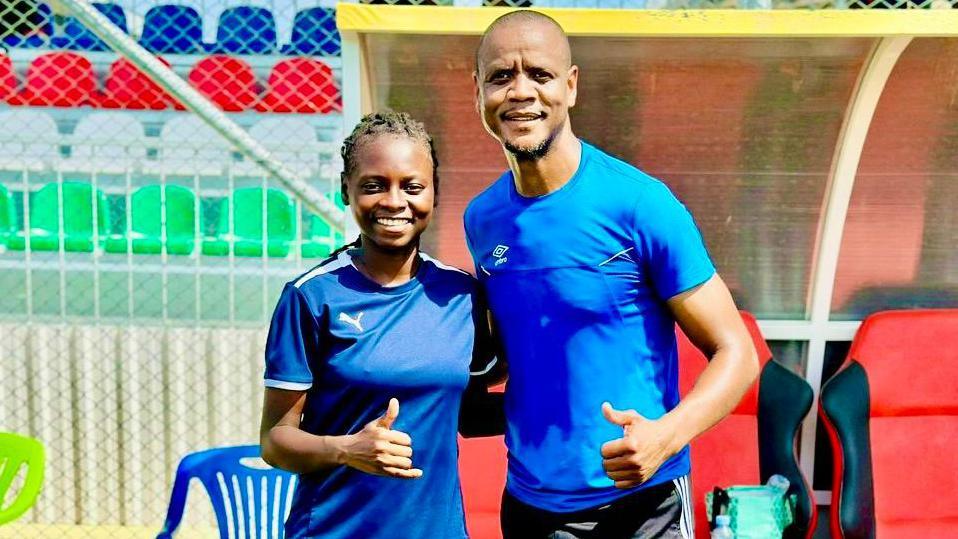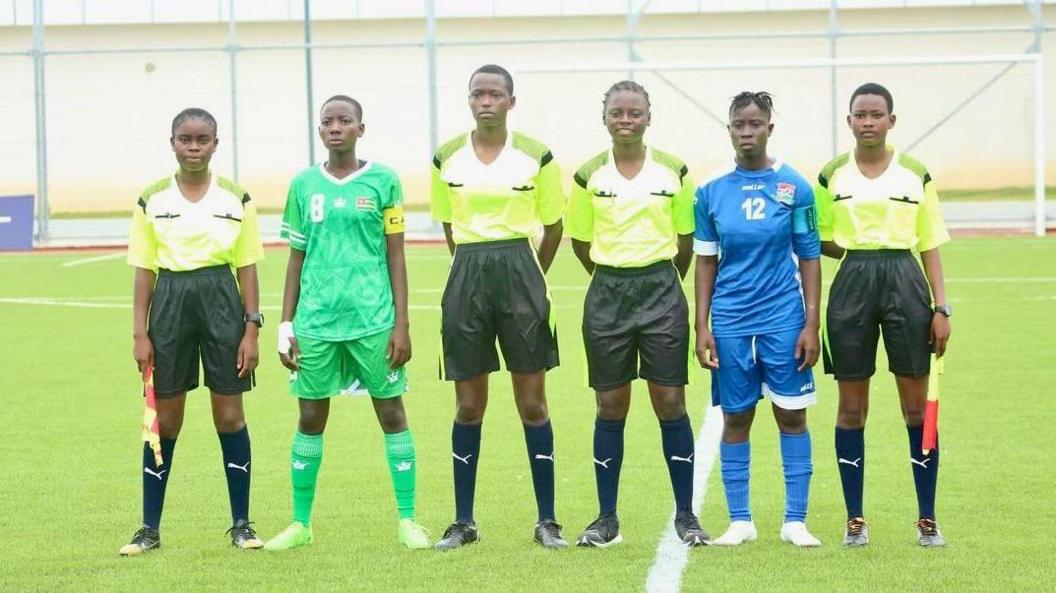'Controlling 22 players on the field is amazing'
Gbemisola Yusuf used to sell drinks at football games in Nigeria but is now a qualified referee
- Published
Gbemisola Yusuf is a woman who likes to be in charge.
And, aged just 21, she is already refereeing football games in Nigeria.
“Controlling 22 players on the field is amazing," she told BBC Sport Africa from the Maracana pitch in Ajegunle-Lagos.
This is no small feat, as Yusuf is amongst a relatively small group of female referees in her country.
Although the number of female match officials in Africa and world football has grown over the years, women remain underrepresented as referees at both continental and global levels.
As of 2023, 53 African women are on world governing body Fifa's international referees list. This includes assistant referees and futsal referees, and represents a significant increase from previous decades.
This steady rise has been largely driven by efforts from organisations like the Confederation of African Football (Caf) and national associations to promote gender inclusivity.
South Africa and Morocco are two countries with a larger proportion of women officiating at the highest levels versus others in the continent.
Female referees in Nigeria and across Africa face a variety of challenges that stem from social, cultural and institutional factors.
The influence of rigid gender roles often limits women’s participation in certain fields, especially sport.
Moreover, the male-dominated nature of football administration and management means women are less likely to be appointed for key games, despite their qualifications.

Yusuf met Janny Sikazwe, who has officiated at the Africa Cup of Nations and Fifa World Cup, at a Caf tournament this year
Yusuf’s journey to refereeing started not too far away from the pitch.
Born and raised in the densely populated and bustling community of Agege in the mainland area of Lagos, the vibrant atmosphere of the township stadium meant everything to her and her family.
As a child, she would regularly go to the local stadium with her mother. There, they would sell drinks to players, coaches and fans alike.
It was during that time that she nurtured a passion for the football scene.
After starting out as a footballer, Yusuf’s decision to switch to refereeing was met with both curiosity and support.
Her mentor, Dele Atoun, a retired referee and current general secretary of the Lagos State Referee Council, vividly recalls her early days.
He told the BBC her life has been "intertwined with the stadium since childhood".
“She built so much courage despite seeing referees attacked, stoned and abused - but she also saw them excel," he added.
Facing down verbal and physical abuse
Yusuf started her refereeing career aged 14 when she joined a programme which Caf had launched to identify, train and provide opportunities for young match officials in youth competitions.
She quickly realised the path she had chosen was not an easy one.
The world of making sure footballers keep to the rules, especially in Nigeria, is fraught with challenges - including verbal and physical abuse from disgruntled fans and players.
In a survey conducted by the Nigeria Referees Association (NRA) about 80% of respondents said they had experienced some form of harassment or violence during their officiating careers.
Most of these incidents happened at grassroots level and lower league matches, where security is often inadequate.
Yusuf witnessed this first-hand but was undeterred.
“I will say refereeing is the hardest job in the world,” she said.
“You make decisions in a few seconds, whether you are right or wrong.”
Instead of being discouraged by the negativity, she has focused on the positive.
A pivotal moment came during a state league match when Yusuf was just 18.
The referees failed to show up and, only minutes before kick-off, Yusuf - who was helping her mother sell drinks at the stadium at the time - was asked to officiate the game.
“She was near perfect in that game, and it caught the attention of many people," Atoun said.
This unexpected opportunity showcased her talent and composure under pressure, earning her recognition within the refereeing community.
Referee, cop and mother – Morocco’s Karboubi
- Published1 February 2024
My tips for the top - pioneering referee Mukansanga
- Published21 July 2023
Yusuf quickly advanced through the ranks, eventually officiating in the Nigerian Women’s Premier League.
Officiating at this level comes with its own set of safety challenges, particularly for women.
Assaults on referees in Nigeria, including female referees, are not uncommon and can range from verbal abuse to physical attacks.
In 2021, a female referee in Kano was chased by fans after officiating a heated local derby. The incident drew widespread condemnation from the Nigeria Football Federation and highlighted the need for tougher security measures at matches, especially those involving female officials.
Data shows that women make up less than 10% of registered referees in Nigeria, and many cite fears of abuse and lack of respect as key reasons for leaving the profession or not pursuing it altogether.
As of 2023, no Nigerian league, including the top flight Nigeria Premier Football League, has implemented video assistant referee (VAR) technology. This puts Nigerian referees at a disadvantage when officiating in international competitions where such tools are the norm.
Yusuf believes that as long as she does the right thing on the field, she has nothing to fear.
“I just give my best and leave the rest to God," she said.
'The stadium girl'

Yusuf started as a player before training as a referee
For Yusuf, the Agege Stadium in Lagos is more than just a place, it represents the foundation of her career.
Though she no longer sells drinks at the stadium because of her academic commitments at the University of Lagos, where she is studying human kinetics and education, her memories are deeply ingrained.
“Everything about my life is the Agege Stadium,” she said.
“That’s where I got the confidence to even join the referees, and the surroundings have helped me a lot.”
Her participation in this year's Caf African Schools Football Championship, where she officiated matches in both regional qualifiers and the finals in Tanzania, was a significant milestone in her career.
"It was a dream come true. The experience was amazing," she added.
“Moving from one country to another, interacting with different referees, and trying to learn new languages was really good for me."
Fluency in multiple languages enhances a referee’s authority on the field. For referees who want to reach the top, such as the Fifa World Cup or the Olympic Games, speaking multiple languages is often essential.
"It was valuable because I never thought I would meet some of the people I did," she said.
The championship not only provided Yusuf with international exposure but also allowed her to connect with the likes of Zambia's Janny Sikazwe, who has officiated at the World Cup.
Meanwhile, the guidance, support and encouragement of mentors like Dele Atoun have helped Yusuf navigate the challenges of her chosen profession.
“I’m proud of her achievements,” Atoun said with a smile.
"Her story is one of resilience and determination.”